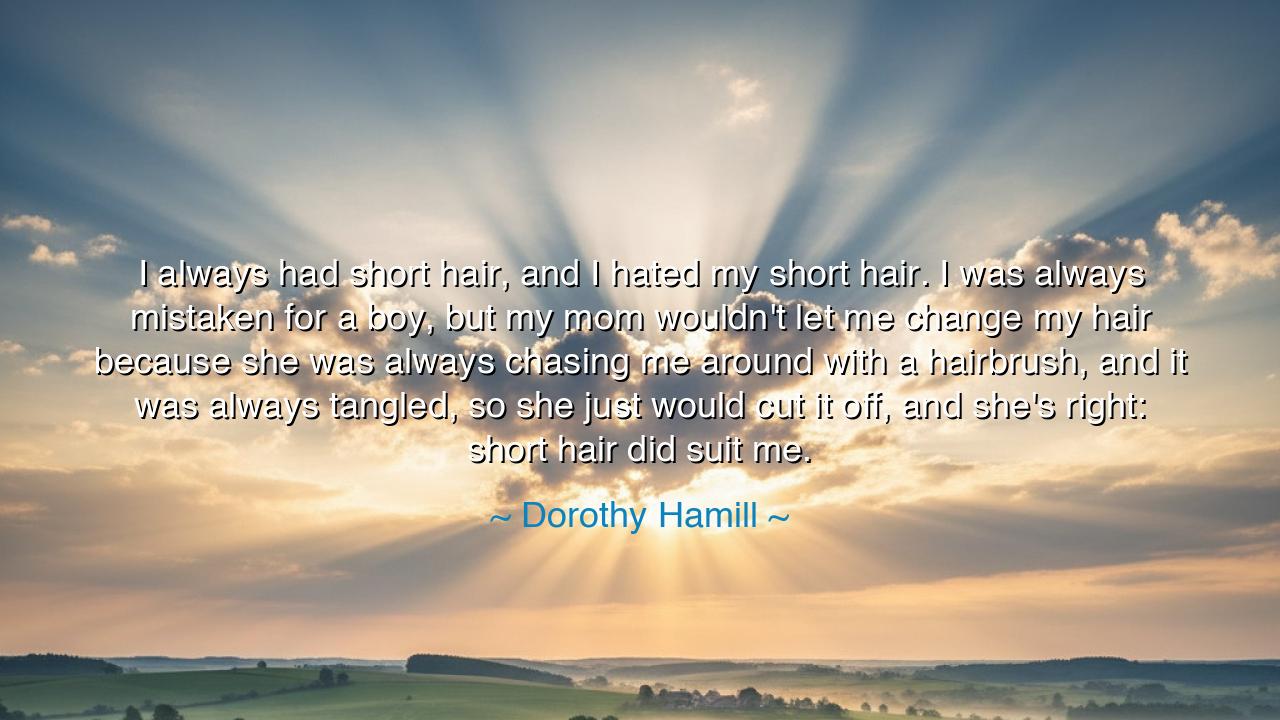
I always had short hair, and I hated my short hair. I was always
I always had short hair, and I hated my short hair. I was always mistaken for a boy, but my mom wouldn't let me change my hair because she was always chasing me around with a hairbrush, and it was always tangled, so she just would cut it off, and she's right: short hair did suit me.






Hear the words of Dorothy Hamill, who confessed her childhood struggle with identity and appearance: “I always had short hair, and I hated my short hair. I was always mistaken for a boy, but my mom wouldn’t let me change my hair because she was always chasing me around with a hairbrush, and it was always tangled, so she just would cut it off, and she’s right: short hair did suit me.” These words are more than recollection—they are testimony to the tension between self-perception and truth, between youthful resistance and parental wisdom, between what we think diminishes us and what, in time, may reveal our strength.
The short hair, so despised in her youth, became a symbol of identity, one she did not choose yet came to accept. It is a lesson in how life often gives us burdens that later reveal themselves as blessings. Though mistaken for a boy, though made to feel different from how she wished to appear, Hamill discovered that her mother’s stubborn practicality had its wisdom. For what she hated became a signature, a mark of distinction, and later, a crown of recognition upon the world’s stage.
The ancients too spoke of such paradoxes. The Spartan children were trained in hardship—made to go hungry, to sleep on reeds, to suffer discipline. At the time, it must have felt cruel, unjust, unbearable. Yet it was this very severity that forged them into warriors feared across the earth. So too in Hamill’s tale: the haircut, born of tangled brushes and exasperation, seemed to strip her of choice, but in truth, it revealed a style uniquely her own, one that came to define her grace as a figure skater. What begins in resistance often flowers in destiny.
Consider also the story of Joan of Arc, mocked for wearing men’s clothing, accused of dishonor for her appearance. Yet what seemed to others a mark of shame became the armor of her mission, the outward sign of her defiance and purpose. Hamill’s short hair, though far gentler in context, follows the same pattern: what once felt like a disguise became, in time, her signature—an emblem of strength and individuality in a world eager to place people into boxes.
The mom, chasing with the hairbrush, represents more than discipline. She represents the sometimes harsh, sometimes loving insistence of those who see us more clearly than we see ourselves. Children often rebel against the judgments of parents, believing themselves misunderstood. Yet in time, many discover that beneath the sternness lies truth, and that guidance, though unwelcome, can save us from struggles greater than we imagined. Hamill’s acceptance—“she’s right: short hair did suit me”—is the moment of reconciliation, when rebellion turns into gratitude, and frustration transforms into wisdom.
From this story arises a clear lesson: often the very things we resist, the traits we despise, the disciplines we resent, become the foundations of our uniqueness. What feels like limitation may actually be a gift shaping us into who we are meant to be. Thus, one must not always flee discomfort, but examine it, for within it may lie hidden purpose.
Therefore, let all who hear take this counsel: do not despise what life places upon you, even if at first it feels burdensome or unfair. What today feels like shame may tomorrow be your distinction. What today feels like restraint may tomorrow be your liberation. Listen also to the wisdom of those who love you, for though they may seem stern, they often see truths hidden from your youthful eyes.
Thus the teaching endures: the battle with the hairbrush, the rebellion against short hair, the sorrow of being mistaken for what one is not—all of these became the seeds of a future strength. Accept, therefore, that the path to destiny is not always chosen freely, but discovered in the very struggles we once wished to escape. For in the end, even resistance may carry us into our truest form.






AAdministratorAdministrator
Welcome, honored guests. Please leave a comment, we will respond soon